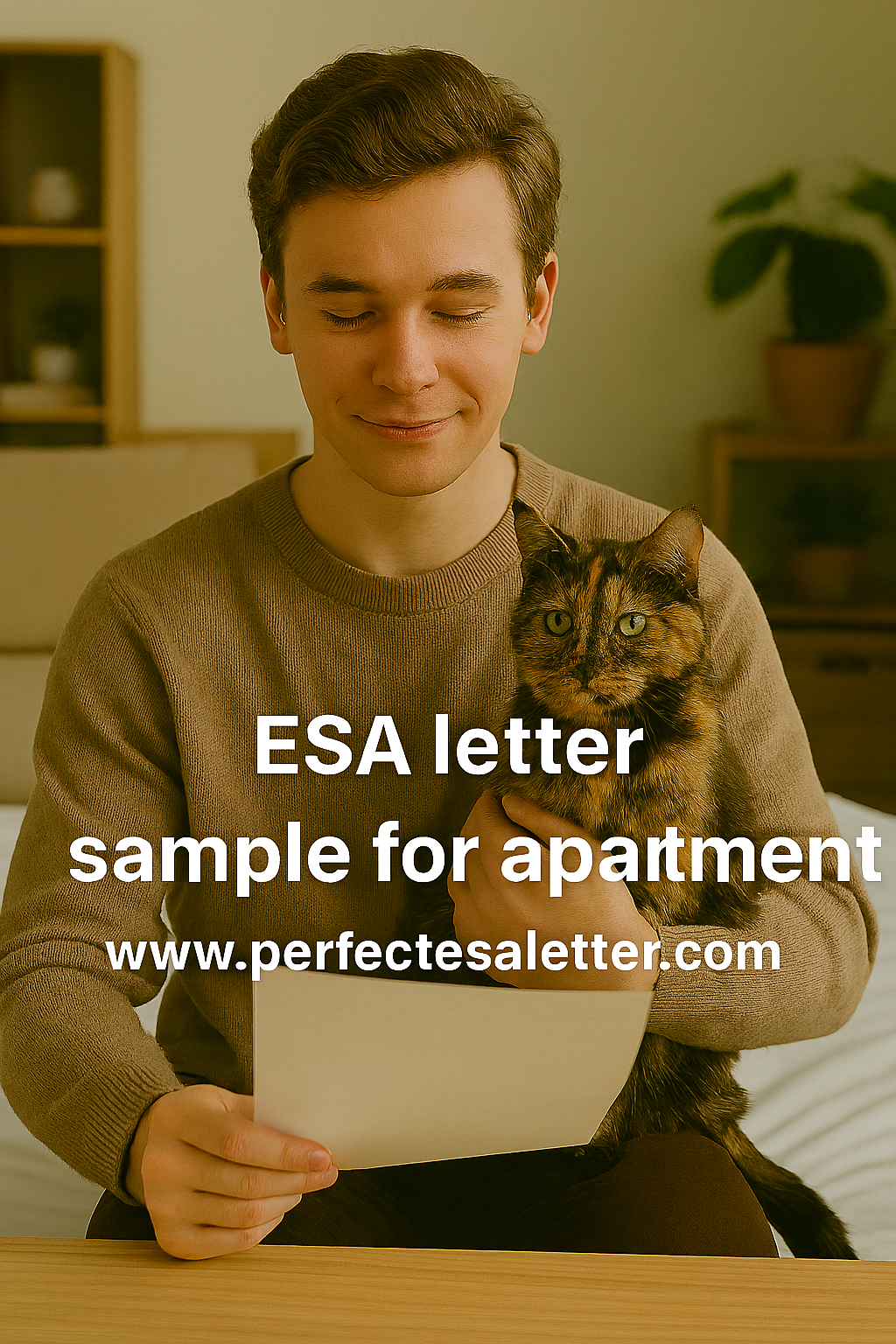ESA Letter Sample for Apartment Rentals: A Complete Guide for Tenants
Introduction
Finding the right apartment can be challenging enough. Add the need for an Emotional Support Animal (ESA), and the process can feel overwhelming. Many landlords enforce “no pets” policies or charge extra pet fees—but under the Fair Housing Act (FHA), tenants with a valid ESA letter cannot be denied housing or charged additional fees because of their ESA.
This is where an ESA letter for apartments becomes essential. In this guide, we’ll explain your rights as a tenant, what landlords can and cannot ask for, and provide a sample ESA letter for apartment rentals.
”Get Yours Now!
Don’t wait until a landlord or airline tells you “no pets allowed.” Protect your rights today.
Please fill out this form and our team wil contact you ASAP.
Complete your assessment in minutes , get approved by a licensed professional, and receive your letter within 24 hours.
ESA Letter and the Fair Housing Act
The FHA (Fair Housing Act) requires landlords and housing providers to make reasonable accommodations for individuals with disabilities. This includes allowing emotional support animals even in buildings with strict no-pet policies.
Key protections under FHA:
- Landlords cannot deny housing based on your ESA.
- Landlords cannot charge pet rent, deposits, or fees for ESAs.
- Landlords may request a valid ESA letter but cannot ask for detailed medical records.
Why Do You Need an ESA Letter for an Apartment?
- Legal Protection
- Ensures landlords comply with FHA requirements.
- Avoiding Extra Fees
- Pet fees and deposits are waived with a valid ESA letter.
- Smooth Communication
- Providing documentation upfront reduces conflicts.
What Should an ESA Letter for Apartments Include?
To be valid under housing laws, an ESA letter must:
✅ Be written by a licensed mental health professional (psychiatrist, psychologist, counselor, therapist).
✅ Be on professional letterhead with contact information.
✅ State that you have a mental/emotional disability as recognized by DSM-5.
✅ Confirm the need for an ESA for your condition.
✅ Contain provider’s name, license number, state, and signature.
✅ Be dated within the past 12 months.
ESA Letter Sample for Apartment
Here’s an example of a proper ESA letter:
[Licensed Professional’s Letterhead]
Date: [MM/DD/YYYY]
To Whom It May Concern,
I am a licensed mental health professional currently treating [Patient’s Full Name]. Based on my evaluation, [he/she/they] has a mental or emotional disability recognized under the DSM-5.
It is my professional opinion that the presence of an Emotional Support Animal is necessary to help alleviate symptoms of this condition and improve my patient’s overall well-being.
As required by the Fair Housing Act, I request that reasonable accommodation be made to allow [Patient’s Full Name] to live with their Emotional Support Animal, even in housing with “no pets” policies. Additionally, no pet fees or deposits should be applied.
If verification is needed, I can be contacted at [Provider’s Phone Number] or [Provider’s Email Address].
Sincerely,
[Provider’s Full Name, Title]
[Professional License Number, State]
[Signature]
How to Submit an ESA Letter to a Landlord
- Provide Early
- Share your ESA letter when applying or immediately after signing a lease.
- Submit in Writing
- Deliver via email or hand-deliver a printed copy for records.
- Stay Professional
- Use polite communication—remember, the law is on your side.
What Landlords Can and Cannot Do
✅ Can Ask For:
- A valid ESA letter from a licensed professional.
❌ Cannot Do:
- Refuse housing due to your ESA.
- Charge pet deposits, pet rent, or fees.
- Demand detailed medical records.
- Deny ESAs based on breed, weight, or size (except in rare cases of safety concerns).
Common Mistakes to Avoid
❌ Submitting an old or expired ESA letter.
❌ Using fake certificates from unverified websites.
❌ Not renewing your ESA letter annually.
❌ Waiting until eviction threats to provide documentation.
Tips for Tenants with ESAs
- Keep your ESA well-behaved to prevent complaints.
- Renew your ESA letter every 12 months.
- Choose apartments known to be pet-friendly for easier approval.
- Keep both digital and physical copies of your letter handy.
FAQs: ESA Letters for Apartments
Q1: Can my landlord deny my ESA?
No, unless the ESA poses a direct safety threat or causes major property damage.
Q2: Can a landlord charge me pet rent for my ESA?
No. ESA-related fees are illegal under the FHA.
Q3: Do I need a separate ESA letter for each landlord?
No. One valid, up-to-date letter works for all housing.
Q4: Can my landlord call my doctor?
Yes, but only to verify the letter’s authenticity—not to ask about your diagnosis.
Conclusion
An ESA letter for apartments is more than just paperwork—it’s your legal shield under the Fair Housing Act. With a valid letter from a licensed mental health professional, you can secure housing without discrimination, avoid unnecessary pet fees, and ensure your ESA is welcome.
By presenting a proper ESA letter sample for apartments, you strengthen your rights as a tenant and create a smoother living arrangement with your landlord.
”Get Yours Now!
Don’t wait until a landlord or airline tells you “no pets allowed.” Protect your rights today.
Please fill out this form and our team wil contact you ASAP.
Complete your assessment in minutes , get approved by a licensed professional, and receive your letter within 24 hours.

